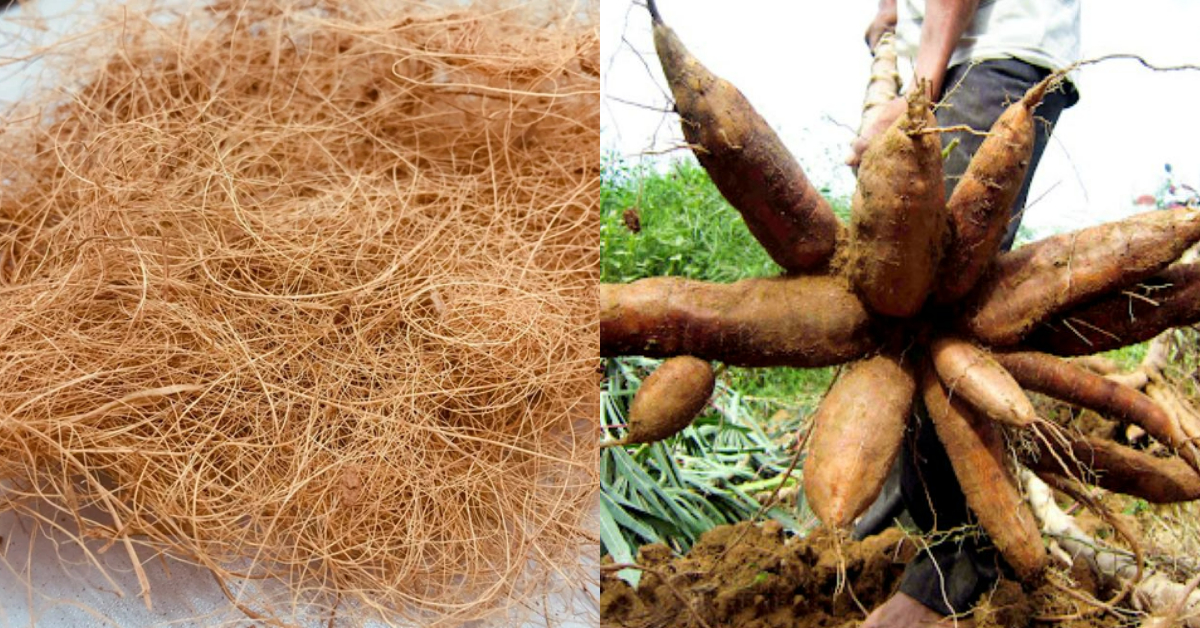
കപ്പ ഇതുപോലെ കൃഷി ചെയൂ; കിലോക്കണക്കിന് കപ്പ ഇനി വീട്ടുമുറ്റത് തന്നെ; ചകിരി തൊണ്ട് മാത്രം മതി; ഈ സൂത്രം നിങ്ങളെ ശെരിക്കും ഞെട്ടിക്കും..!! | Kappa Krishi Tips Using Coconut Husk
Kappa Krishi Tips Using Coconut Husk : കപ്പ കഴിക്കാൻ ഇഷ്ടപ്പെടാത്ത മലയാളികൾ വളരെ കുറവായിരിക്കും. എന്നാൽ വീട്ടിലേക്കുള്ള കപ്പ കടകളിൽ നിന്നും വാങ്ങി ഉപയോഗിക്കുന്നവരാണ് ഇന്ന് കൂടുതൽ പേരും. സ്ഥലപരിമിതി, കപ്പ വളർത്തിയെടുക്കാനുള്ള ബുദ്ധിമുട്ട് എന്നിവ മൂലമാണ് പലരും കപ്പ കൃഷി വീട്ടിൽ ചെയ്യാൻ മടിക്കുന്നത്. എന്നാൽ വളരെ എളുപ്പത്തിൽ വളരെ കുറഞ്ഞ സ്ഥലത്ത് കപ്പ കൃഷി എങ്ങനെ ചെയ്തെടുക്കാൻ സാധിക്കുമെന്ന്
വിശദമായി മനസ്സിലാക്കാം. കപ്പ കൃഷി ചെയ്യാനായി ആവശ്യമായിട്ടുള്ളത് ഒരു പ്ലാസ്റ്റിക് ചാക്ക്, പോട്ടിംഗ് മിക്സ്, ജൈവ വളം, ചകിരി, പൊത ഇട്ടു കൊടുക്കാനുള്ള കരിയില എന്നിവയാണ്. ആദ്യം തന്നെ ഒരു പ്ലാസ്റ്റിക് ചാക്കെടുത്ത് അതിന്റെ ഏറ്റവും താഴത്തെ ലയറിലായി കുറച്ച് ചകിരി നിറച്ചു കൊടുക്കുക. ശേഷം ചാക്കിന്റെ മുകൾഭാഗം ഒരു നൂലുപയോഗിച്ച് കെട്ടിക്കൊടുക്കുക. ചാക്ക് നിലത്തുവച്ച്
നടുഭാഗത്തായി ഒരു ബ്ലേഡ് ഉപയോഗിച്ച് സ്ക്വയർ രൂപത്തിൽ കട്ട് ചെയ്തു കൊടുക്കുക. കരിയിലയുടെ മുകളിലായി അല്പം ജൈവ കമ്പോസ്റ്റ് ഇട്ടു കൊടുക്കാവുന്നതാണ്. ഇവ അടുക്കളയിൽ നിന്നും ലഭിക്കുന്ന വേസ്റ്റ് ഉപയോഗിച്ച് തന്നെ തയ്യാറാക്കാനായി സാധിക്കും. ശേഷം അതിന് മുകളിൽ പോട്ടിംഗ് മിക്സ് ഇട്ടുകൊടുക്കുക. വീണ്ടും മുകളിലായി അല്പം കൂടി മണ്ണ് ഇട്ട് ഫിൽ ചെയ്ത ശേഷം നടുഭാഗത്തായി കപ്പയുടെ
മൂത്ത തണ്ടു നോക്കി വെട്ടിയെടുത്ത് നട്ട് കൊടുക്കാവുന്നതാണ്. ശേഷം കുറച്ച് കരിയില മണ്ണിന്റെ ചുറ്റുമായി വിതറി കൊടുക്കുക. കപ്പ വളർന്ന് തുടങ്ങുമ്പോൾ ചാരം ഇടയ്ക്കിടയ്ക്ക് വളമായി ഇട്ടു കൊടുക്കാവുന്നതാണ്. ഇത്രയും ചെയ്തു കഴിഞ്ഞാൽ അടുക്കള ആവശ്യത്തിനുള്ള കപ്പ വീട്ടിൽ തന്നെ എളുപ്പത്തിൽ നിന്നും കിട്ടുന്നതാണ്. കൂടുതൽ വിശദമായി മനസ്സിലാക്കാൻ വീഡിയോ കാണാവുന്നതാണ്. Kappa Krishi Tips Using Coconut Husk credit : POPPY HAPPY VLOGS
🌴 Kappa Krishi Tips Using Coconut Husk
1. Soil Conditioner
- Shred or chop the coconut husk into small pieces.
- Mix with soil to improve aeration and water retention.
- Ideal for dry or sandy soils to help retain moisture.
- Also reduces soil compaction, promoting root growth.
2. Mulching
- Use the outer fibrous layer (coir) as mulch.
- Helps in:
- Moisture conservation
- Weed control
- Temperature regulation
- Coconut husk mulch slowly decomposes, enriching the soil over time.
3. Composting Accelerator
- Coconut husk can be added to your compost pile:
- Acts as carbon-rich material (“brown” component).
- Balances nitrogen-rich greens (like kitchen waste, grass clippings).
- Speeds up decomposition and enhances compost quality.
4. Hydroponic and Soilless Growing Medium
- Use coir pith or coco peat derived from husk as a growing medium.
- Excellent for seed starting or soilless farming.
- Offers good root aeration, water retention, and is pH neutral.
5. Biochar + Coconut Husk
- Burn dried coconut husk into biochar (in low-oxygen conditions).
- Mix into the soil to:
- Improve nutrient retention
- Act as a habitat for beneficial microbes
- Enhance soil fertility long-term.
6. Natural Pest Barrier
- Placing husk pieces around plants acts as a physical barrier to snails, slugs, and some insects.
- Also helps keep the soil surface protected from erosion.
7. Water Filtration in Irrigation
- Use coconut husk fibers to filter irrigation water in small-scale systems.
- Helps in reducing sediments and some impurities before water reaches plants.
⚠️ Tips to Remember:
- Soak or wash coconut husks before use to remove excess salts (especially if using for seedlings or sensitive plants).
- Ensure good drainage if using large husk chunks in pots—too much moisture can cause root rot.
- For composting, chop into smaller pieces to speed up breakdown.
If you’re doing Kappa Krishi in Kerala or similar tropical regions, coconut husk is a local, low-cost, and sustainable resource—perfect for regenerative practices.

Comments are closed.